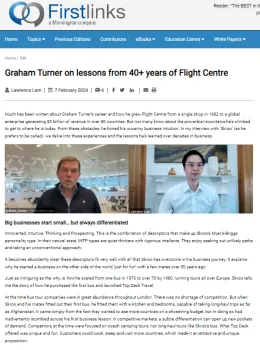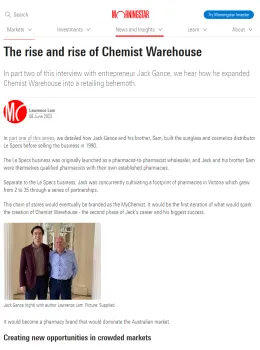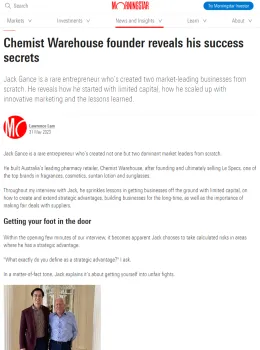First published in Firstlinks, 7 February 2024
Much has been written about Graham Turner’s career and how he grew Flight Centre from a single shop in 1982 to a global enterprise generating $3 billion of revenue in over 80 countries. But not many know about the proverbial mountains he’s climbed to get to where he is today. It is through these many storms that his uncanny business intuition has been honed. In my interview with ‘Skroo’ (as he prefers to be called), we unstitch the fabric of these experiences and the lessons he’s learnt over decades in business.

Graham Turner and Lawrence Lam
Big Businesses Start Small… But Always Differentiated
Introverted, Intuitive, Thinking and Prospecting. This is the combination of descriptors that make up Skroo’s Myer’s-Briggs personality type. In their natural state, INTP types are quiet thinkers with vigorous intellects. They enjoy seeking out unlikely paths and taking an unconventional approach.
It becomes abundantly clear these descriptors fit very well with all that Skroo has overcome in his business journey. It explains why he started a business on the other side of the world ‘just for fun’ with a few mates over 50 years ago.
Just as intriguing as the why, is how he scaled from one bus in 1973 to over seventy by 1980, running tours all over Europe. Skroo tells me the story of how he purchased the first bus and launched Top Deck Travel. At the time bus tour companies were in great abundance throughout London. There was no shortage of competition. But when Skroo and his mates fitted out their first bus, he fitted them with a kitchen and bedrooms, capable of taking long-haul trips as far as Afghanistan. It came simply from the fact they wanted to see more countries on a shoestring budget, but in doing so had inadvertently stumbled across his first business lesson: in competitive markets, a subtle differentiation can open up new pockets of demand. Competitors at the time were focused on coach camping tours, not long-haul tours like Skroo’s bus. What Top Deck offered was unique and fun. Customers could cook, sleep and visit more countries, which made it an attractive and unique proposition.
A Unique Value Proposition
The ease with which seats were filled gave Skroo and his business partner a taste of early success. Although the business concept of blue oceans would be popularised some decades later, Skroo had already discovered the advantages of creating new markets early on through the differentiation of the tour experience. The unit economics were prime for scaling. At a cost of £12 in weekly marketing costs (Skroo tells me the first ads were placed in a weekly travel newspaper published in London called the Australiasian Express), Topdeck could confidently fill a bus which would deliver revenues of £1,650. Even accounting for other expenses, each trip was profoundly profitable.
Scaling became easy with the growing demand and self-generating cashflows. Two years into operations, Topdeck made £15,000 profit and had several buses touring all over Europe. Along the way, he enjoyed many free overland trips, including a 3-month drive from London to Kathmandu. Underneath Skroo’s thoughtful and calm demeanour was a strong desire for growth and success. He still enjoys winning in the game of business. As he says “Founders are generally empire builders. One bus was never enough for me. It had to be 2, 3, or 10.”
But how does a founder balance the investment required to scale, with the cash needs in the short-term? It was a question of balancing long-term growth and short-term liquidity. Initially, they developed a general rule: every bus purchase should only be made if they were confident it could be paid back in 2-3 trips. The model worked well for the first 10 years as they scaled to 70 buses but by 1980 the market changed. Skroo was about to learn his toughest lesson in business when Topdeck almost filed for bankruptcy.
Balancing Liquidity and Scalable Unit Economics
By 1980 Topdeck had seventy buses all over Europe and despite the strong growth trajectory, found itself short of cash when forward bookings in the winter were weaker than expected. And because it had a model that relied on rapid scaling and reinvestment of cash back into more buses, Topdeck became exceptionally reliant on forward bookings. It was the business’s first near death experience and taught Skroo a lesson in cash management. Its importance became abundantly clear as Skroo was turned down by banks who had no interest in financing a bus tour business. There would be no white knights. No one was going to save Topdeck in its most crucial time of need. As Skroo aptly puts it: “banks are more likely to loan money to those that don’t need it”.
They survived by the skin of their teeth only because cash from bookings originating from Australia and New Zealand started flowing through in April of 1980. The southern hemisphere booking season had come through just in time. It was a close call. Survival had come from internal cash, not external. In business there is no such thing as a deus ex machina.
For Skroo, the importance of cash is a recurring lesson he sees over and over again. Forty years on, even after he left the Topdeck business in 1986 and returned to Australia to eventually start Flight Centre, his recollection of that moment is as visceral as ever. That moment shaped how Flight Centre would manage its cash position, and the amount of debt it would hold going forward.
***
For our other articles on founders, search ‘Founder interview’ in our Knowledge Bank





